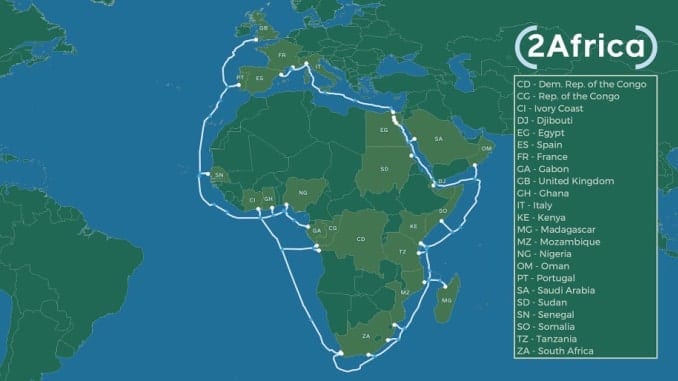Tech giant, Facebook, announced on May 14 that it is building a 37,000-kilometer undersea cable around Africa to provide the continent’s inhabitants with better access to the internet.
Facebook is building a massive underwater cable around Africa, in an effort to bring more of the continent’s 1.3 billion inhabitants online.
The social media company has partnered with the likes of China Mobile, South Africa’s MTN, France’s Orange and Britain’s Vodafone as well as local network operators on the project, dubbed 2Africa.
It’s tasked Nokia-owned cable systems provider Alcatel Submarine Networks with building the subsea cable. At 37,000 kilometers — or about 22,991 miles — in length, Facebook claims the cable will be “nearly equal to the circumference of the Earth.” It’s not yet clear how much funding Facebook and its partners have put behind the project.
A primary goal of the initiative, Facebook says, is to bring increased connectivity to Africa. The continent is “currently the least connected” in the world, the company wrote in a blog post-Wednesday, with just over a quarter of its population having internet access.

The subsea cable will interconnect 23 countries in Africa, the Middle East and Europe. Facebook states it will “provide nearly three times the total network capacity of all the subsea cables serving Africa today.”
Facebook said the 2Africa project was made more efficient by the use of aluminum rather than copper fibers, as these could help increase network capacity. The company is now in the process of developing a new crossing linking the Red Sea with the Mediterranean, which it claims will be the first in that region in more than a decade.
Nevertheless, the move from Facebook highlights increased interest from Silicon Valley companies in Africa as a high-growth investment opportunity. Twitter CEO Jack Dorsey last year said he planned on moving to the region — though he recently had to “reevaluate” that ambition due to the coronavirus outbreak.
Facebook previously had plans to beam internet to remote areas using solar-powered drones. Called Aquila, the company shuttered the project back in 2018, but has reportedly been working with Airbus to test such drones again in Australia.
